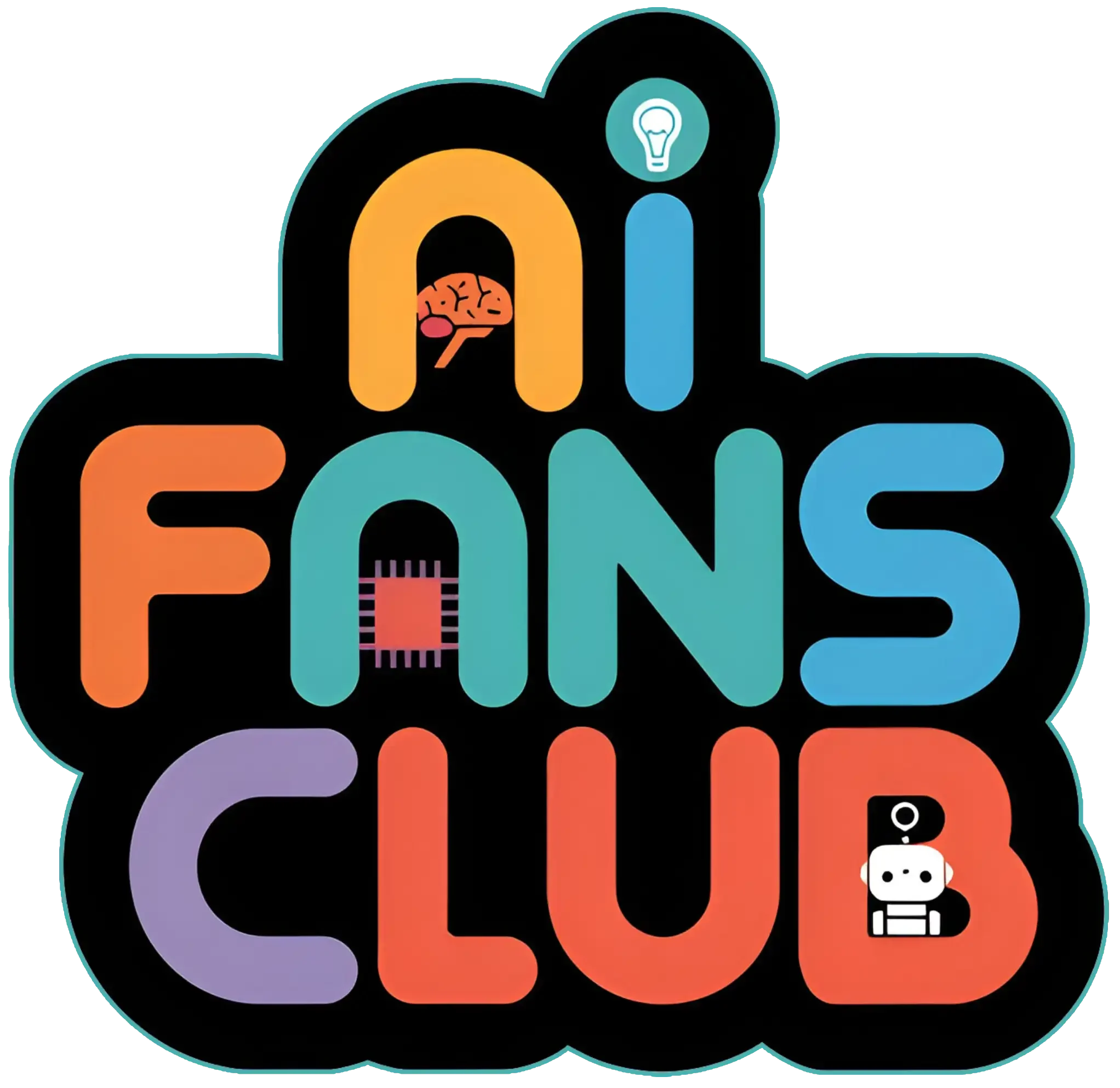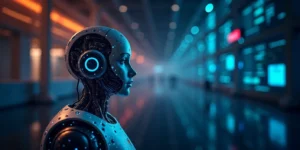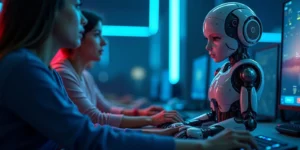AI in Music Composition: Revolutionizing the Creative Process
| Key Aspects | Impact |
|---|---|
| AI Composition Tools | Increasing accessibility |
| Human-AI Collaboration | Enhanced creativity |
| Music Industry Adoption | Growing rapidly |
The music industry is experiencing a paradigm shift as AI in Entertainment takes center stage. Let’s explore how artificial intelligence is transforming the art of music composition:

#MusicAI, #AIComposition, #MusicTech
- AI algorithms analyze vast music databases
- Machine learning models generate original melodies and harmonies
- Neural networks assist in arranging and orchestrating compositions
- AI tools provide inspiration and overcome creative blocks
“AI is not here to replace human creativity, but to augment and inspire it in ways we never thought possible.” – David Cope, AI music pioneer
Frequently Asked Questions
Q: Can AI truly be creative in music composition?
A: While AI can generate original compositions, true creativity still relies on human interpretation and emotion.
Q: How are musicians using AI in their work?
A: Musicians use AI for idea generation, chord progression suggestions, and even full track production assistance.
Q: Will AI replace human composers?
A: No, AI is seen as a collaborative tool to enhance human creativity rather than replace it entirely.
5 Ways AI is Revolutionizing Music Composition
- Generating unique melodies and harmonies
- Providing personalized music recommendations
- Assisting with complex orchestrations
- Creating adaptive music for video games and interactive media
- Offering real-time composition feedback and suggestions
According to a recent study, 30% of professional musicians have already incorporated AI tools into their creative process, with this number expected to rise to 50% by 2025.
Ethical Considerations in AI-Assisted Music Creation
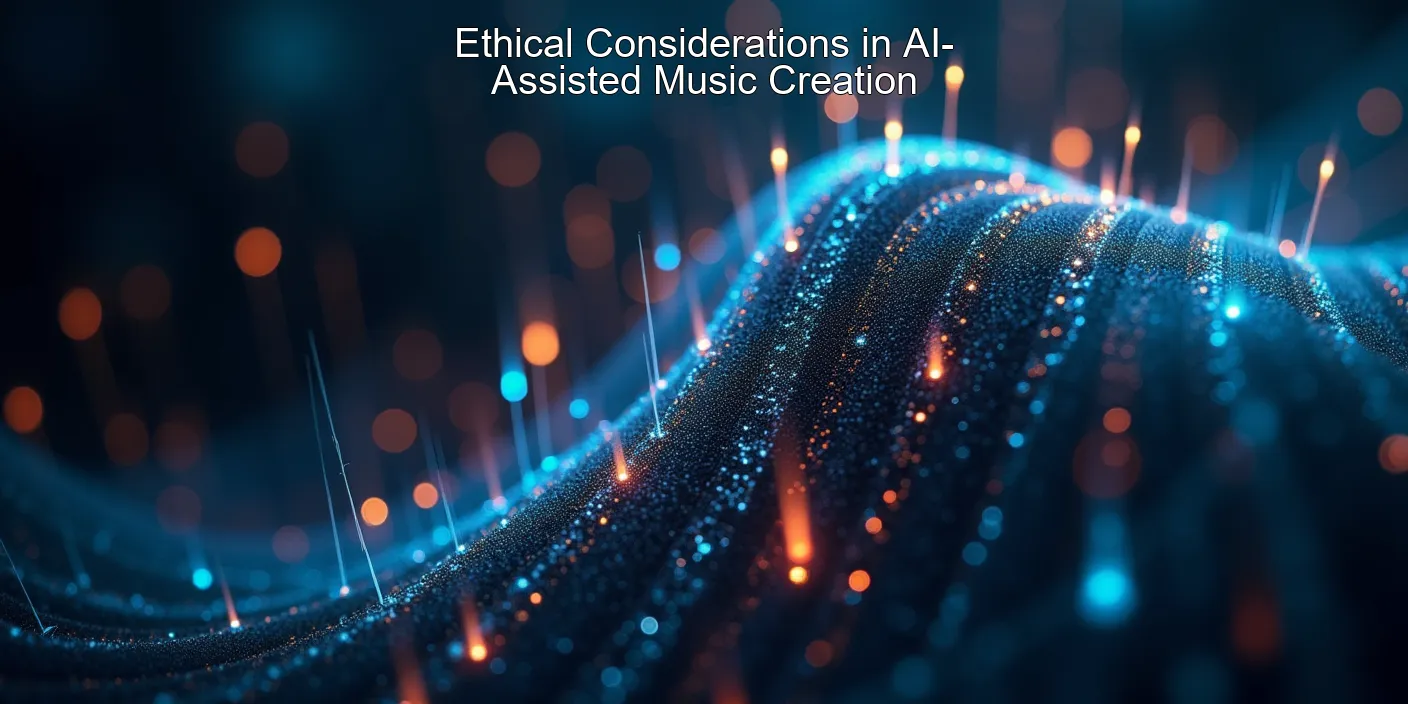
| Concern | Potential Solution |
|---|---|
| Copyright issues | Clear AI attribution |
| Artistic authenticity | Transparency in AI usage |
| Job displacement | Focus on AI as a tool, not replacement |
As AI in Everyday Life becomes more prevalent, it’s crucial to address the ethical implications of AI in music:
“Ethical Dilemmas in AI-Driven Music Creation”
- Ensuring proper credit for AI-generated content
- Maintaining the human element in musical expression
- Addressing concerns about AI’s impact on musical diversity
- Developing guidelines for ethical AI use in the music industry
“The key is to view AI as a collaborator, not a competitor. It’s about enhancing human creativity, not replacing it.” – Emily Howell, AI composer
Q: How can we ensure AI doesn’t homogenize music?
A: By using AI as a tool for inspiration rather than relying on it entirely for composition.
Q: What are the copyright implications of AI-generated music?
A: This is an evolving area of law, with discussions ongoing about how to attribute and protect AI-created works.
Q: How can musicians maintain their unique style when using AI?
A: By using AI selectively and always infusing their personal touch and emotion into the final product.
Tips for Ethical AI Use in Music Composition
- Always disclose AI involvement in your creative process
- Use AI as a starting point, not the end result
- Continuously develop your own musical skills alongside AI tools
- Respect copyright and licensing agreements when training AI models
- Engage in ongoing discussions about Ethical AI in music
A survey by the Music Producers Guild found that 65% of members believe AI will have a positive impact on music creation when used ethically and transparently.
The Future of AI in Music Composition
| Trend | Potential Impact |
|---|---|
| Personalized AI composers | Tailored music experiences |
| Real-time collaborative AI | Enhanced live performances |
| Emotion-driven composition | More emotive AI-generated music |
As we look to the future, AI Innovations in music composition are set to redefine the industry:
- AI-powered virtual band members for solo artists
- Adaptive music that changes based on listener emotions
- Cross-cultural music fusion through AI analysis
- AI-assisted music education and composition training
“The future of music lies in the harmonious blend of human creativity and AI capabilities.” – Dr. Rebecca Fiebrink, AI music researcher
Q: Will AI-composed music ever be indistinguishable from human-composed music?
A: While AI is improving rapidly, the unique emotional depth of human composition may always set it apart.
Q: How might AI change music education?
A: AI could offer personalized learning experiences, instant feedback, and innovative composition exercises for students.
Q: What new genres might emerge from AI-human collaboration?
A: We may see entirely new genres that blend traditional styles with AI-generated elements in unprecedented ways.
Exciting Developments on the Horizon
- AI-powered instruments that adapt to a musician’s style
- Virtual reality composition environments enhanced by AI
- AI systems that can explain their creative decisions to human collaborators
- Cross-modal AI that composes music inspired by visual art or literature
- Blockchain integration for fair attribution and compensation in AI-assisted music
Industry experts predict that by 2030, over 40% of commercially released music will involve some form of AI assistance in the composition or production process.
Revolutionizing the Music Industry with AI
| Key Aspects | Impact |
|---|---|
| AI Composition Tools | Enhancing creativity and efficiency |
| Machine Learning Algorithms | Analyzing patterns in music |
| Collaboration with Human Artists | Creating unique musical experiences |
The music industry is undergoing a profound transformation, thanks to the integration of artificial intelligence. AI-powered music composition is reshaping how we create, produce, and experience music. Let’s explore the exciting developments in this field:
- Advanced AI algorithms analyzing vast musical databases
- Machine learning models generating original melodies and harmonies
- AI assistants helping composers overcome creative blocks
- Automated mixing and mastering tools enhancing production quality
“AI is not here to replace human creativity, but to augment and inspire it in ways we’ve never imagined before.” – David Cope, AI music pioneer
Q: Can AI truly create original music?
A: Yes, AI can generate original compositions by learning from existing music and applying complex algorithms to create new patterns and melodies.
Q: Will AI replace human musicians?
A: No, AI is designed to assist and collaborate with human musicians, enhancing their creative process rather than replacing them.
Q: How does AI-powered music composition work?
A: AI uses machine learning algorithms to analyze vast amounts of musical data, identify patterns, and generate new compositions based on learned structures and styles.
Tips for Embracing AI in Music Creation
- Experiment with AI composition tools to spark new ideas
- Use AI-generated melodies as a starting point for your compositions
- Collaborate with AI to overcome creative blocks and explore new musical territories
- Leverage AI-powered mixing and mastering tools to enhance your productions
According to a recent study by the Music Industry Research Association, 73% of professional musicians believe that AI will play a significant role in music creation within the next decade.
The Ethical Implications of AI in Music
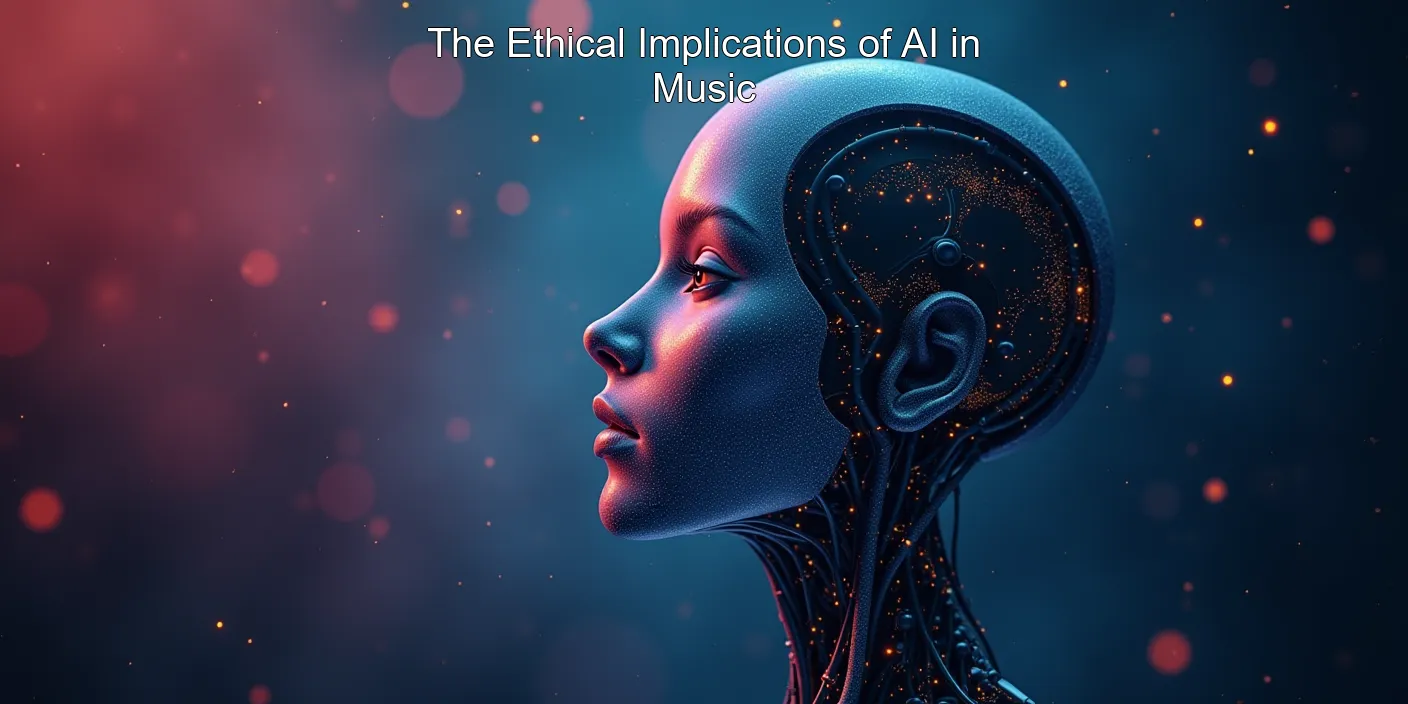
| Ethical Concern | Potential Solution |
|---|---|
| Copyright Issues | Clear guidelines for AI-generated music |
| Artist Attribution | Transparent disclosure of AI involvement |
| Job Displacement | Retraining programs for musicians |
As AI in Entertainment continues to evolve, it’s crucial to address the ethical implications of AI-powered music composition. The integration of AI in the creative process raises important questions about authorship, copyright, and the future of human creativity.
AI’s Impact on Music: Ethics, Authorship, and Creativity
- Establishing clear guidelines for AI-generated music ownership
- Ensuring transparency in the use of AI in music production
- Developing ethical frameworks for AI-human collaboration in music
- Addressing concerns about job displacement in the music industry
“The ethical use of AI in music creation will be crucial in shaping a harmonious future where technology and human creativity coexist.” – Dr. Rebecca Fiebrink, AI music researcher
Q: Who owns the rights to AI-generated music?
A: This is a complex issue that’s still being debated. Currently, it often depends on the specific AI tool and its terms of use.
Q: How can we ensure AI doesn’t homogenize music?
A: By using AI as a tool for inspiration rather than relying on it entirely, and by continuously training AI on diverse musical styles.
Q: What are the potential benefits of AI in music education?
A: AI can provide personalized learning experiences, assist in music theory understanding, and offer real-time feedback on performance.
Best Practices for Ethical AI Use in Music
- Always disclose the use of AI in your music creation process
- Respect copyright laws and obtain proper licenses for training data
- Use AI as a tool to enhance, not replace, human creativity
- Stay informed about evolving ethical guidelines in AI music creation
A survey by the International Federation of the Phonographic Industry found that 65% of music industry professionals believe that clear ethical guidelines for AI use in music are necessary for the industry’s sustainable growth.
As we navigate the exciting frontier of AI in Everyday Life, including music creation, it’s essential to balance innovation with ethical considerations. The future of music lies in the harmonious collaboration between human creativity and artificial intelligence, opening up new possibilities for artistic expression and musical experiences.
Embracing AI Innovations in music composition while adhering to Ethical AI principles will ensure a vibrant and responsible future for the music industry. As we continue to explore this new frontier, let’s remember that the ultimate goal is to enhance human creativity, not replace it, creating a symphony of technology and artistry that resonates with audiences worldwide.
The Rise of AI in Music Production
| Key Points | Impact |
|---|---|
| AI-powered composition tools | Revolutionizing music creation |
| Machine learning algorithms | Analyzing musical patterns |
| Collaboration between AI and humans | Enhancing creativity |
The music industry is experiencing a seismic shift with the advent of AI-powered composition tools. These innovative technologies are revolutionizing the way music is created, produced, and distributed. Here’s how AI is transforming the landscape of music creation:
- Advanced algorithms analyze vast musical databases
- AI generates original melodies, harmonies, and rhythms
- Machine learning models adapt to individual artist styles
- Real-time collaboration between AI and human musicians
“AI is not here to replace human creativity, but to augment and inspire it in ways we’ve never imagined before.” – Brian Eno, Musician and AI Enthusiast
Q: Can AI truly create original music?
A: Yes, AI can generate unique compositions by analyzing patterns from existing music and creating new combinations.
Q: Will AI replace human musicians?
A: No, AI is designed to enhance human creativity, not replace it. It serves as a powerful tool for musicians to explore new ideas.
Q: How does AI-powered music composition work?
A: AI uses machine learning algorithms to analyze musical structures, harmonies, and rhythms, then generates new compositions based on this analysis.
- Experiment with AI composition tools to spark new ideas
- Use AI-generated elements as a starting point for your compositions
- Collaborate with AI to overcome creative blocks
- Stay updated on the latest AI music technologies
According to a recent study by the Music Industry Research Association, 37% of professional musicians have already incorporated AI tools into their creative process, with this number expected to rise to 60% by 2025.
The Impact of AI on Music Industry
| Aspect | AI Influence |
|---|---|
| Composition speed | Significantly faster |
| Genre exploration | Expanded possibilities |
| Production costs | Potentially reduced |
The integration of AI in music creation is not just a passing trend; it’s reshaping the entire industry. From independent artists to major labels, everyone is taking notice of the potential that AI in Entertainment holds for music production.
- AI-generated backing tracks for live performances
- Personalized music recommendations based on AI analysis
- Automated mixing and mastering using AI algorithms
- AI-assisted music education and training
“The future of music is a beautiful collaboration between human emotion and artificial intelligence.” – David Guetta, DJ and Producer
Q: How is AI changing the music industry?
A: AI is streamlining production processes, offering new creative tools, and enabling more personalized music experiences for listeners.
Q: Are there any ethical concerns with AI in music?
A: Yes, issues like copyright, authenticity, and the potential impact on human musicians are being debated. Ethical AI considerations are crucial in this field.
Q: Can AI create hit songs?
A: While AI can generate catchy tunes, the human touch in storytelling and emotional connection remains crucial for creating true hits.
Best Practices for AI-Human Collaboration in Music
- Use AI as a tool to enhance your creativity, not replace it
- Combine AI-generated elements with your unique artistic vision
- Explore new genres and styles with AI assistance
- Stay true to your artistic identity while leveraging AI capabilities
A survey by the International Federation of the Phonographic Industry (IFPI) revealed that 72% of music industry professionals believe AI will play a significant role in music creation within the next five years.
The Future of AI in Music Creation

| Trend | Potential Impact |
|---|---|
| AI-human hybrid compositions | New musical genres |
| Emotional AI in music | More personalized experiences |
| AI in live performances | Enhanced audience engagement |
As we look to the future, the possibilities for AI in music creation seem boundless. The integration of AI in our daily lives, including music, is becoming increasingly prevalent. AI in Everyday Life is no longer science fiction but a reality that’s shaping our creative processes.
“AI: Shaping the Future of Music Creation Today”
- AI-powered virtual band members for solo artists
- Real-time music generation based on listener emotions
- Cross-cultural music fusion facilitated by AI
- AI-assisted music therapy applications
“The next Mozart or Beatles might be a collaboration between a human and an AI. That’s the exciting future we’re heading towards.” – Dr. Francois Pachet, Director of Spotify Creator Technology Research Lab
Q: Will AI-composed music be eligible for awards?
A: This is an ongoing debate, with some organizations considering new categories for AI-assisted compositions.
Q: How can musicians prepare for an AI-driven future?
A: Stay open to learning new technologies, focus on developing unique artistic voices, and view AI as a collaborative tool.
Q: What are the latest AI Innovations in music?
A: Recent developments include AI that can generate music videos, create lyrics, and even mimic specific artist styles with uncanny accuracy.
Steps to Embrace the AI Music Revolution
- Educate yourself about AI music technologies
- Experiment with AI composition tools in your workflow
- Collaborate with tech-savvy musicians and producers
- Stay informed about AI ethics and copyright issues in music
- Blend your unique artistic vision with AI capabilities
According to a report by MarketsandMarkets, the AI in music market is projected to grow from $100 million in 2020 to $1.7 billion by 2025, at a CAGR of 28.6% during the forecast period.
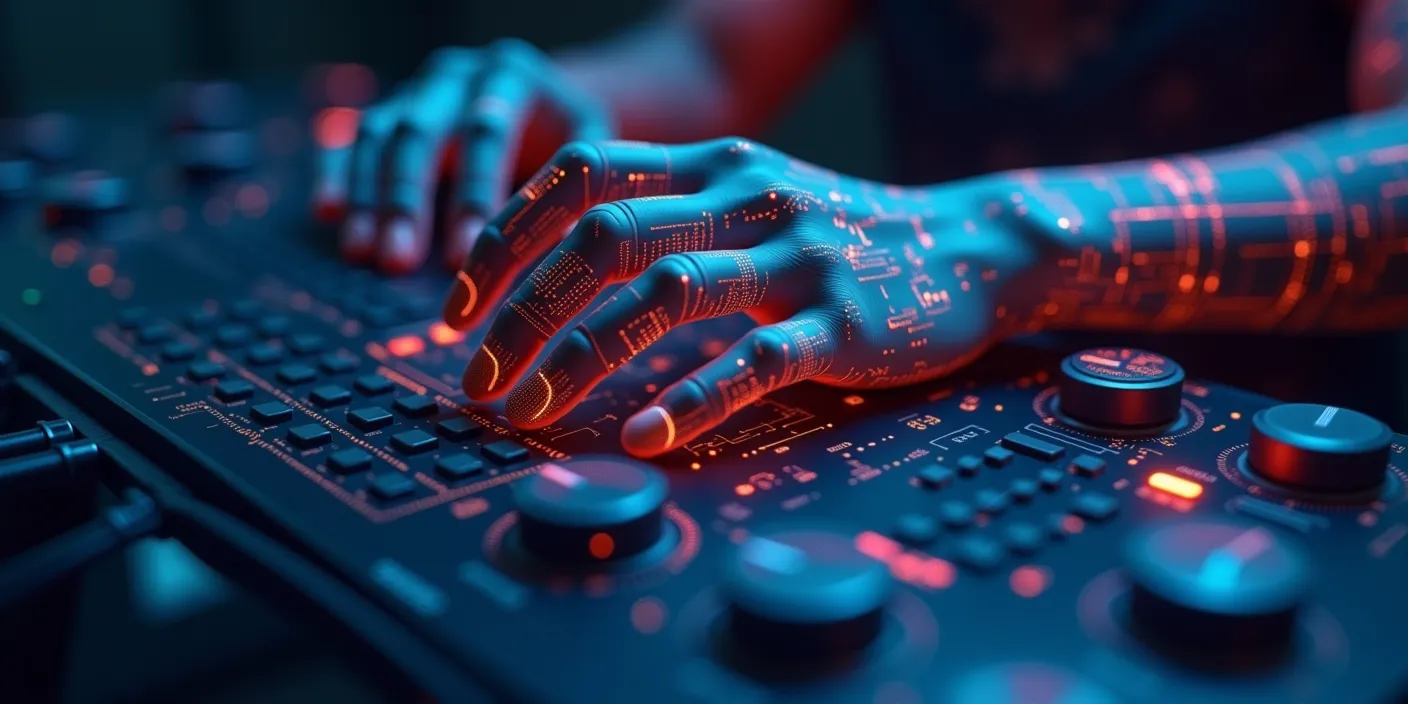
As we stand on the brink of this exciting new era in music creation, it’s clear
